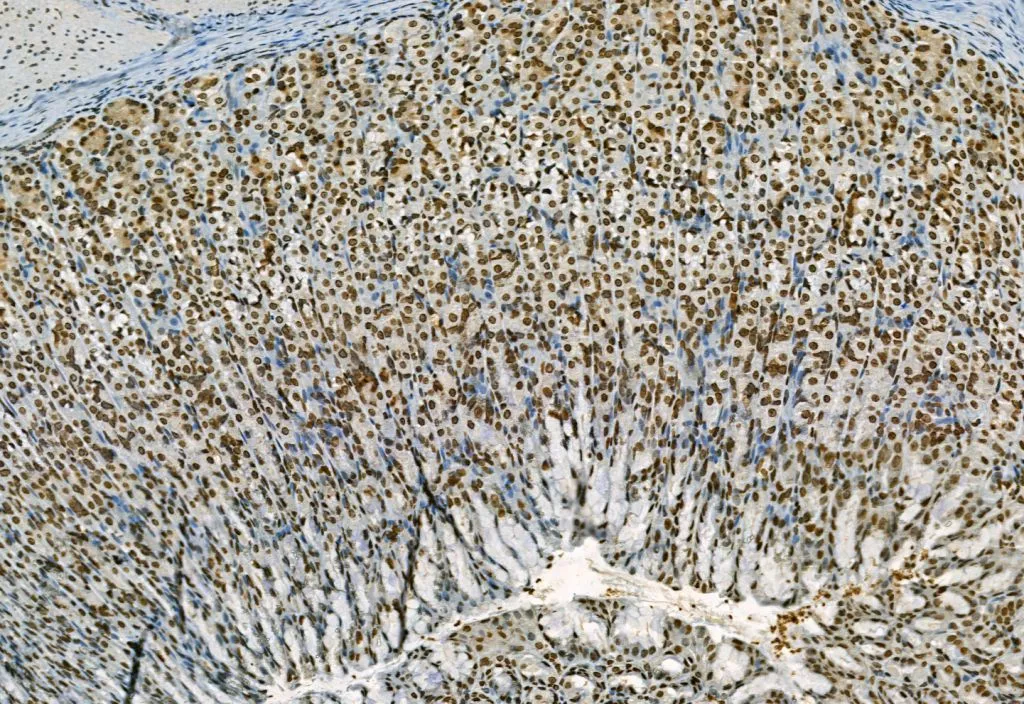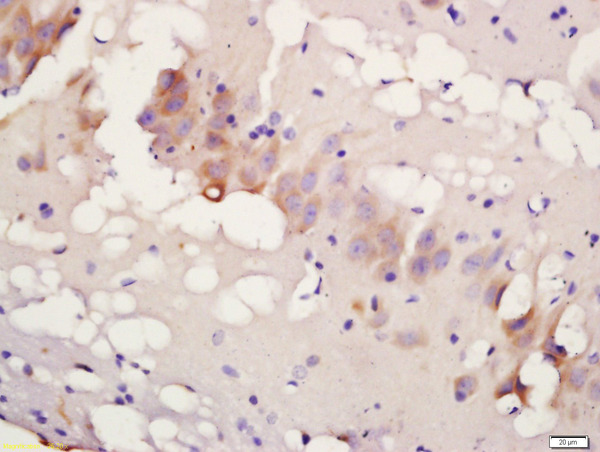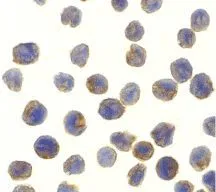![WB analysis of HEK293 mock cells (Lane 1) or overexpressing human NAK / TBK1 using GTX12116 NAK / TBK1 antibody [108A429]. Dilution : 2 μg/ml WB analysis of HEK293 mock cells (Lane 1) or overexpressing human NAK / TBK1 using GTX12116 NAK / TBK1 antibody [108A429]. Dilution : 2 μg/ml](https://www.genetex.com/upload/website/prouct_img/normal/GTX12116/GTX12116_905_WB_w_23060519_390.webp)
WB analysis of HEK293 mock cells (Lane 1) or overexpressing human NAK / TBK1 using GTX12116 NAK / TBK1 antibody [108A429]. Dilution : 2 μg/ml
NAK / TBK1 antibody [108A429]
GTX12116
ApplicationsImmunoFluorescence, Western Blot, ImmunoCytoChemistry, ImmunoHistoChemistry, ImmunoHistoChemistry Paraffin
Product group Antibodies
ReactivityBovine, Canine, Human, Mouse, Rat
TargetTBK1
Overview
- SupplierGeneTex
- Product NameNAK / TBK1 antibody [108A429]
- Delivery Days Customer9
- Application Supplier NoteWB: 1 - 2 microg/ml. ICC/IF: 1:20. IHC-P: 1:20 - 1:1000. *Optimal dilutions/concentrations should be determined by the researcher.Not tested in other applications.
- ApplicationsImmunoFluorescence, Western Blot, ImmunoCytoChemistry, ImmunoHistoChemistry, ImmunoHistoChemistry Paraffin
- CertificationResearch Use Only
- ClonalityMonoclonal
- Clone ID108A429
- Concentration1 mg/ml
- ConjugateUnconjugated
- Gene ID29110
- Target nameTBK1
- Target descriptionTANK binding kinase 1
- Target synonymsAIARV, FTDALS4, IIAE8, NAK, T2K, serine/threonine-protein kinase TBK1, NF-kB-activating kinase, NF-kappa-B-activating kinase
- HostMouse
- IsotypeIgG1
- Protein IDQ9UHD2
- Protein NameSerine/threonine-protein kinase TBK1
- Scientific DescriptionThe NF-kappa-B (NFKB) complex of proteins is inhibited by I-kappa-B (IKB) proteins, which inactivate NFKB by trapping it in the cytoplasm. Phosphorylation of serine residues on the IKB proteins by IKB kinases marks them for destruction via the ubiquitination pathway, thereby allowing activation and nuclear translocation of the NFKB complex. The protein encoded by this gene is similar to IKB kinases and can mediate NFKB activation in response to certain growth factors. For example, the protein can form a complex with the IKB protein TANK and TRAF2 and release the NFKB inhibition caused by TANK. [provided by RefSeq]
- ReactivityBovine, Canine, Human, Mouse, Rat
- Storage Instruction-20°C or -80°C,2°C to 8°C
- UNSPSC12352203
References
- Zhao B, Du F, Xu P, et al. A conserved PLPLRT/SD motif of STING mediates the recruitment and activation of TBK1. Nature. 2019,569(7758):718-722. doi: 10.1038/s41586-019-1228-xRead this paper
- Ogasawara N, Sasaki M, Itoh Y, et al. Rebamipide suppresses TLR-TBK1 signaling pathway resulting in regulating IRF3/7 and IFN-α/β reduction. J Clin Biochem Nutr. 2011,48(2):154-60. doi: 10.3164/jcbn.10-69Read this paper

![IHC-P analysis of human testis tissue using GTX12116 NAK / TBK1 antibody [108A429]. IHC-P analysis of human testis tissue using GTX12116 NAK / TBK1 antibody [108A429].](https://www.genetex.com/upload/website/prouct_img/normal/GTX12116/GTX12116_383_IHC-P_w_23060519_182.webp)
![ICC/IF analysis of HeLa cells using GTX12116 NAK / TBK1 antibody [108A429]. Green : primary antibody Red : Tubulin Blue : DAPI Dilution : 1:10 ICC/IF analysis of HeLa cells using GTX12116 NAK / TBK1 antibody [108A429]. Green : primary antibody Red : Tubulin Blue : DAPI Dilution : 1:10](https://www.genetex.com/upload/website/prouct_img/normal/GTX12116/GTX12116_116_ICC-IF_w_23060519_784.webp)
![WB analysis of Daudi (left) and Raw 264.7 (right) cell lysate using GTX12116 NAK / TBK1 antibody [108A429]. WB analysis of Daudi (left) and Raw 264.7 (right) cell lysate using GTX12116 NAK / TBK1 antibody [108A429].](https://www.genetex.com/upload/website/prouct_img/normal/GTX12116/GTX12116_908_WB_w_23060519_131.webp)
![WB analysis of Daudi (A) and RAW264.7 (B) cell lysate using GTX12116 NAK / TBK1 antibody [108A429]. Dilution : 2 μg/ml WB analysis of Daudi (A) and RAW264.7 (B) cell lysate using GTX12116 NAK / TBK1 antibody [108A429]. Dilution : 2 μg/ml](https://www.genetex.com/upload/website/prouct_img/normal/GTX12116/GTX12116_906_WB_w_23060519_916.webp)





